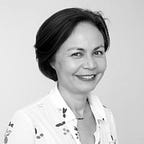The Age of Experience will change the way we communicate science
Co-authored with Owen Gaffney
Imagine biking down a cycle lane along a busy city street. The poor air quality is quantified and visible on your personal dashboard in your eyepiece. So too is the temperature and weather data. But more, the digital map of your route is seamlessly integrated in to your view. Up ahead and out of sight a traffic jam threatens to slow your journey but this information is caught in time and a new route calculated.
It’s 2016, and that future is starting to look very real. For decades, virtual reality, augmented reality and artificial intelligence (AI) have been spoken about as the next big things. Recent breakthroughs in these fields are now dissolving the boundaries between physical and virtual. From a mobile-first to an AI-first world of pervasive computing where people unfurl from their smartphones and enter a new, kinetic dance with technology to make sense of this new world. It’s going to radically change how we interact with science.
Yet few in the scientific community — bar those developing the technology — are fully aware of the potential.
At the Future Earth Media Lab, we are seeking partnerships with people who are keen to explore how this new technology will play out for communicating science and in particular global sustainability. Imagine what people’s relationship with science will look like in a world where scientific knowledge can be unlocked from being static and screen-based to something that can directly interact with our brains and bodies through these new technologies.
Take artificial, or augmented reality? This is what the US company Magic Leap is working on. It might just be the next big thing in computing. Unlike VR, which uses stereoscopic 3-D to trick your eyes into believing what you see is real, Magic Leap, Hololens and other AR applications shine light into your eyes and enable a dazzling overlay of digital things onto the real world.
Writer and futurist Kevin Kelley describes his experience with Magic Leap in a recent Wired article. “I saw human-sized robots walk through the actual walls of the room. I could shoot them with power blasts from a prop gun I really held in my hands. I watched miniature humans wrestle each other on a real table top, almost like a Star Wars holographic chess game. These tiny people were obviously not real, despite their photographic realism, but they were really present — in a way that didn’t seem to reside in my eyes alone; I almost felt their presence.”
This video gives a sense of what it could feel like.
These new forms of computation will be more intuitive, they will be constantly learning from our behaviours and gestures and they will change our relationship with the world as well as our cognition.
One can imagine a future in which people anywhere can connect with the wonder and awe of science via these immersive, experiential forms. Indeed this is already happening with virtual reality in the classroom.
So learning about science and the communication of science are no longer separate, but become one and the same.
We’d like to invite you to join a conversation about the future of science communication in this new, emerging world. We need to experiment boldly and find partners who can challenge our assumptions of what’s possible. We need to create our own series of regular meet-ups for a new community to emerge around these ideas.
Our next Anthronaut Experience hackathon is in Melbourne in August. We’re also launching an inaugural challenge*: Visualising Cities, to search for the best urban visualisations — in virtual reality or data visualisation — the UN Habitat III summit which will bring 40,000 people to Quito in Ecuador to discuss the future of cities.
With partners the International Council for Science and the Urban Complexity Lab.
